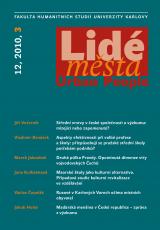Aspekty efektivnosti při volbě profese a školy
Přizpůsobují se pražské střední školy potřebám podniků?
DOI:
https://doi.org/10.14712/12128112.3591Klíčová slova:
education, human capital, supply and demand for working skills, employment in industriesAbstrakt
The choice of professions and the selection of secondary schools are some of the most important events determining the quality of life. At the same time, enterprises cannot function without properly skilled workers. Schools, too, should avoid producing useless professionals. Families, schools and employers must cooperate before making those decisions carrying long-term repercussions. They must emit and receive the relevant signals that would in the future adjust the supply of specialised young workers (i.e., the entrants to the labour market) to the demand of enterprises for specialists in various professions. In this paper, we study two crucial questions of economic decision-making: (a) How are people motivated in their choice of profession (career) and schools? This is also a decision that deals with the criteria for building human capital; (b) Can enterprises rely on the supply of new qualified workers for filling their future specialised demands? This is also the problem of having school admissions consistent with the structure required by labour inputs with specific skills. By analysing the data for the agglomeration of Prague, we have found that the adjustment of the supply of new specialised workers (i.e., school graduates) to the demand of employers (i.e., enterprises) was quite flexible. Our analysis, working with 28 professional types of secondary schools in Prague, reveals that the choice of school and profession depends primarily on the industrial structure of both employment opportunities and unemployment threats. As a secondary observation, the structure of new admissions to schools is related to the level of wages, profits, unemployment rates and R&D expenditures in industries. The ensuing adjustment of school graduates (or school enrolment) to changing structures of production in Prague reveals that more extensive public information about vacancies, expansion or shrinking of both employment, output, labour income or unemployment by professions could be an efficient instrument for influencing the labour market consistency of decision making in both families and schools.
Stahování
Publikováno
Jak citovat
Číslo
Sekce
Licence

Tato práce je licencována pod Mezinárodní licencí Creative Commons Attribution-NonCommercial-NoDerivatives 4.0.


